构词法 - Word Formation
英语主要有三种构词法
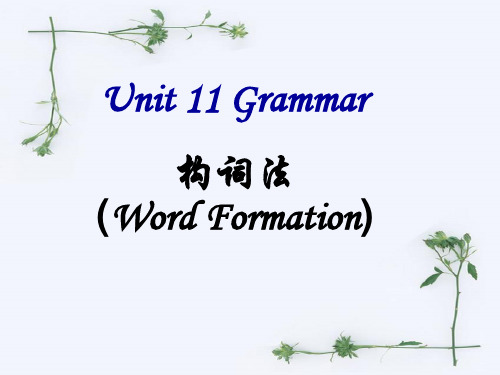
Language points (word study)
1.belief n. 信任, 信心, 信仰 常
与in连用
have a belief in 相信, 信任 That man has a strong belief in God. 那个男子虔诚地信仰上帝。 He has lost the belief in God. Beyond belief 无法令人相信;令人难以置信 His story is beyond belief. 他的话难以置信。 a common belief 普通的信念 religious belief 宗教信仰
2.名词转化为动词 e.g The hall can seat two thousand people They have booked their plane ticket.
3.形容词转化为动词
e.g. The car slowed down to half its speed.
The room gradually quieted down.
动词:
-fy (使…化) ; -ize (使…成为) e.g. simplify(简化) , satisfy , realize , organize
副词:
- ly 表示方式,程度 : freely ,badly ,truly -ward (s) 表示方向 :towards, forward, outward
后
缀
例
runner ,
词
swimmer
--er ….. 者
-ese….地方的人
Chinese, Japanese
名
-ian
精通…的人, …地方人 musician, Russian
(完整word版)英语基本构词法

英语基本构词法英语最基本的构词法(word formation)有三种:派生(derivation)、合成(compounding)和转化(conversion)。
利用构词法记忆单词,可以记忆成串,举一反三。
Ⅰ.派生法派生词缀和词根结合,或者粘着词根和粘着词根结合构成单词的方法,叫做派生法(derivation),也称作缀词法。
用派生法构成的词叫做派生词(derivative)。
派生词的词缀法是英语构词法中最活跃的一种,在英语构词的历史上发挥极其重要的作用。
另外,这种构词法也是我们可以发挥能动性借以扩大词汇量的一种构词法。
词缀分为前缀和后缀两种。
A.前缀1.表示“否定”、“相反”意义的前缀:de- decrease减少;decentralize分散;degrade降级,降低……的地位;dis- dislike不喜欢;disagree不同意;distrust不信任;disappear消失;il- illegal不合法的;illogical不合逻辑的;illegalize宣布……为非法;im- impossible不可能的;immoral不道德的;impractical不现实的;un- unwilling 不情愿的;unbelievable 难以置信的;unnecessary 不必要的等等。
2.表示时间先后的前缀ex- ex-husband前夫;ex-president前总统;fore- foretell语言;foresight先见之明,预见;foresee预见,预知;mid- midterm其中的;midnight午夜;post- postwar战后的;postgraduate研究生;postdoctoral博士后的等等。
3.表示方向位置的前缀ex- export出口;exclude把……排斥在外;external外部的;in- input输入;indoor室内的;inrush涌入;incoming进来的等等。
英语词汇构词法(Word-formation)

英语词汇构词法(Word-formation)英语构词通常包括六种方法:转化法、派生法、合成法、混合法、截短法和首尾字母结合法。
一、英语词汇构词法之【转化法】英语构词法中把一种词性用作另一种词性而词形不变的方法叫作转化法,有的名词可以作动词,有的形容词可以作副词或动词。
1.动词转化为名词1)意思没有变化,例如:I think we'd better finish the talk now.我想我们的谈话最好现在结束。
2)意思有一定变化,例如:He is a man of strong build.他是一个体格健壮的汉子。
3)构成短语,例如:Let's have a look first. 我们先看一下吧。
2.名词转化为动词1)表示物体的,如:Have you booked the ticket?你订好票了吗?2)表示身体部位的,如:Hand in your papers please.请把你们的试卷交上来。
3)表示一类人的,如:She nursed her husband back to health.她看护丈夫,使他恢复了健康。
4)抽象名词,如:We breakfasted together.我们在一起吃了早餐。
3.形容词转化为动词少数形容词可以转化为动词。
例如:We will try our best to better our living conditions.我们要尽力改善我们的生活状况。
4.副词转化为动词有少数副词可以转化为动词。
例如:Murder will out.恶事终必将败露。
5.形容词转化为名词1)表示颜色的形容词常可转化为名词,如:The girl in black appears very beautiful.那个穿黑衣服的女孩子看上去非常漂亮。
2)一些形容词如old, young, poor, rich, wounded, injured等与the连用,表示一类人,作主语时,谓语用复数,如:We don't belong to the rich, but we don't belong to the poor, either. 我们不是有钱人,但我们也不是穷人。
单词的形成方式

单词的形成方式单词的形成方式有以下几种:1. 构词法(derivation/word formation):通过添加前缀、后缀、词缀或派生词来改变词的意义和词类。
例如,添加前缀 "un-"可以将形容词变为相反意义的词,如 "happy"(快乐的)变为"unhappy"(不快乐的)。
2. 合成法(compounding):通过将两个或多个词组合成一个新的词。
例如,"black"(黑色的)和 "board"(板)组合成"blackboard"(黑板)。
3. 转化法(conversion):通过改变词的词类而不改变词的形式。
例如,"cook"(动词,烹饪)可以转化为 "cook"(名词,厨师)。
4. 缩略法(abbreviation):通过缩短单词或词组来形成简化的词。
例如,"information"(信息)可以缩写为 "info"。
5. 借词法(borrowing):从其他语言中引入新词。
例如,英语中借用了许多法语、拉丁语、希腊语和其他语言的词和短语。
6. 高频率使用词法(back formation):通过从一个较复杂的词中移除看似是后缀的部分来形成一个新的词。
例如,"editor"(编辑者)被认为是从 "edit"(编辑)中移除了后缀 "-or" 形成的。
除了上述方式外,还有一些其他形成单词的方式,如吸收外来词(loanwords)、混合词(blending)、模仿声音词(onomatopoeia)等。
单词的形成方式的多样性使得语言能够不断发展和适应社会的需求。
Word Formation 构词法

-ese 表示“ ……国人,……地方的人”:Chinese, Japanese, Cantonese
-ess 表示“阴性人称名词”:actress, hostess, manageress
-logist 表示“……学家,研究者”:biologist, geologist
21
2.构成具有抽象名词的含义: -age 表示“状态,行为,身份及其结果,总称”:
courage, storage, marriage, percentage -al 表示“事物的动作,过程”:refusal, arrival,
八、表示“自我”: self-
self-protection, self-made, self-knowledge,self-introduction, self-defence, self-taught, self-reliance, selfawareness
15
九、表示变换词类作用的前缀: bebefriend enenslave, enable, enrich, enlarge, encourage
18
后缀: 一、名词后缀: 1. 具有某种职业或动作的人: -an, -ian, -ician 表示“……地方的人,精通……的
人”:American, Asian, Australian, Russian, Italian , historian, librarian, electrician, magician, technician, musician, politician, physician -ant,-ent 表示“……人”:merchant, servant, assistant, agent, student -ee 表示“动作承受者”:employee, examinee, payee, interviewee -eer 表示“从事于……人”:engineer, volunteer
word-formation
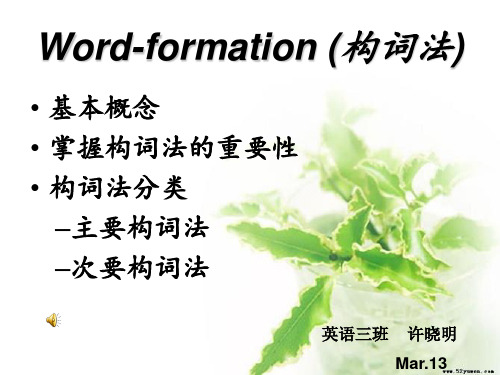
• 名词转化为动词
– 许多表示物件的名词可以转化为动词,意思也 随之有些改变:
• She had booked three seats on the plane . • The usher seated us in the front row.
– 表示身体某部位的名词也可以用作动词:
①care careful careless carefully carelessly carefulness
②courage courageous courageously encourage
5)建立清楚的词类概念,每学一个词都要知道 他的词类,并掌握与它相关的词,左引右联, 很容易形成一个词汇网,这是掌握英语的第 一步。
• 合成形容词
– 合成形容词很多有多去分词或带-ed词尾的词 构成:
• absent-minded 心不在焉的 • broken-hearted 心碎的
– 也有不少合成形容词由动词的-ing形式和另外 一词构成:
• close-fitting 紧身的 • far-reaching 深远的(影响)
– 还有一些合成词由“形容词+名词”或“名词 等+形容词”构成:
– dry cleaning
fast food
– first-aid
French fries
– high jump
high school
• 有些合成词由动词-ing形式和另一个词构成:
– dining room
drawing pin 图钉
– driving license frying pan
– sleeping bag
air raid
构词法 Word Formation
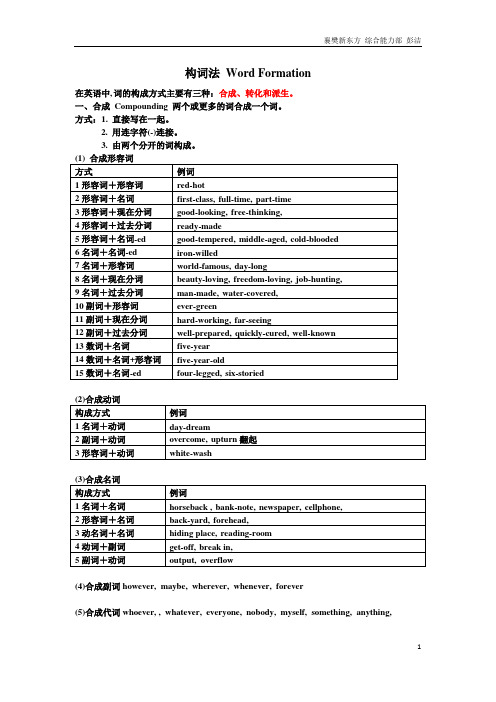
构词法Word Formation
在英语中,词的构成方式主要有三种:合成、转化和派生。
一、合成Compounding 两个或更多的词合成一个词。
方式:1. 直接写在一起。
2. 用连字符(-)连接。
3. 由两个分开的词构成。
(4)合成副词however, maybe, wherever, whenever, forever
(5)合成代词whoever, , whatever, everyone, nobody, myself, something, anything,
二、派生Derivation
注意:-ese, -ian, -ist 既可以构成名词, 又可以构成形容词。
三、转化Conversion: 指一个词不变化词形, 而由一种此类转化为另一种词类或几种词类。
1. 名词和动词之间的转化
telephone电话——打电话, mirror镜子——像镜子一样反映, drink喝——饮料, record录音——记录, name, date, hand, study,
2. 形容词转化为动词
perfect完美的——使完善
3.名词转化为形容词(副词)
front前面——前面的
4.形容词转化为名词
chief 主要的——首领。
words formation—构词法.

构 词 法 知 识
Derivation派生法 Compound 合成法
Conversion 转化法
简略词 合成词
缩略词
掌握基本的构词法知识,对 于正确地识记单词,扩大词
汇量,。
派生法 Derivation 派 生 法 后缀 前缀
否定前缀 其他前缀 名词后缀 形容词后缀 副词后缀 动词后缀
1 常见的否定前缀
中学英语课本中有许多单词带有否定 前缀,如果能理解这些否定前缀的含
义,使用和记忆单词是很有帮助的。
否定前缀加在一个词的前面就完全改 变或否定了这个词的原来意义。
前 缀 意
义 用
法
例
词
un-
加在形容 unhappy, 不,未 词或副词 unnecessary, (= not) 前 untouched, 相反动 uncover, untie, 加在动词 作 unwrap, 前 unlock
upward, uphold, uphill(上坡)
3 表示人和物的名词后缀
后缀 意 义 用 法 -er 从事…职 加在动 业的人, 词、名 做…的人, 词、形 … 地方的 表 容词上 人 示 -or 与-er同义 外来后 缀,加 人 在外来 词上 -eer 从事于... 用于外 的人 来词 例词 teacher, worker learner, visitor, educator
engineer, mountaineer
用 法 加于名词后, 女...的 表示阴性 -ician 加在以-ic结尾 ...(专)家, 的名词或形容 表 词上 示 从事...职业 加在名词上, 人 -ist 的人,从事 或 –ize 结尾的 某种...文艺、 动词上,或以学术的人 al结尾的其它 词上 -er 表示从事某 加在动词和名 表 工作的物 词或复合词上 示 表示从事某 加在动词上 物 -or 工作的物
构词法(Wordformation)
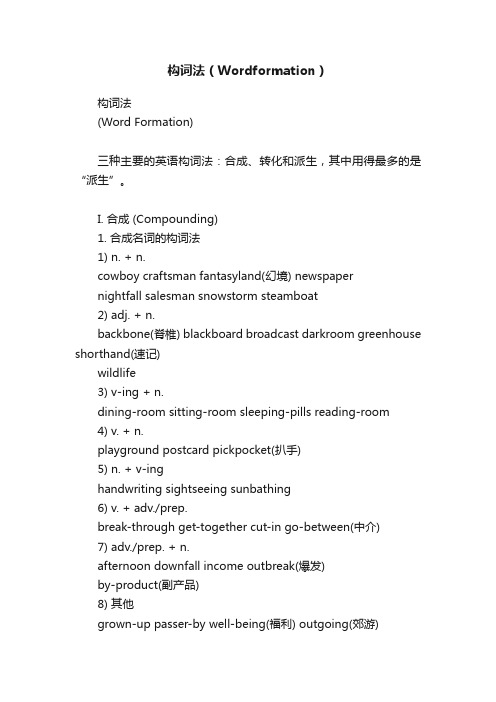
构词法(Wordformation)构词法(Word Formation)三种主要的英语构词法:合成、转化和派生,其中用得最多的是“派生”。
I. 合成 (Compounding)1. 合成名词的构词法1) n. + n.cowboy craftsman fantasyland(幻境) newspapernightfall salesman snowstorm steamboat2) adj. + n.backbone(脊椎) blackboard broadcast darkroom greenhouse shorthand(速记)wildlife3) v-ing + n.dining-room sitting-room sleeping-pills reading-room4) v. + n.playground postcard pickpocket(扒手)5) n. + v-inghandwriting sightseeing sunbathing6) v. + adv./prep.break-through get-together cut-in go-between(中介)7) adv./prep. + n.afternoon downfall income outbreak(爆发)by-product(副产品)8) 其他grown-up passer-by well-being(福利) outgoing(郊游)2. 合成形容词的构词法1) n. + v-edhandmade man-made sunburnt state-run2) n. + v-ingEnglish-speaking peace-loving3) n. + adj.snow-white world-famous worldwide duty-free(免税的)4) adj./num. + n-edcold-blooded good-tempered(脾气好的) noble-mined warm-hearted three-legged5) adj./adv. + v-ingeasy-going funny-looking outgoing(开朗的)hard-working far-reaching(深远的)6) adj./adv. + v-ednew-born ready-made newly-built well-known7) 其evergreen face-to-face worn-out up-to-date part-time full-time3. 合成动词的构词法1) adv. + v.overthrow overwork underline uphold(支持)2) adj. + n.blacklist(列黑名单) whitewash(粉刷)3) n. + v.sleep-walk(梦游) sunbathe typewriteII. 转化 (Conversion)1) v. – n. / n. – v.break v. 打破– break n. 休息taste v. 品尝– taste n. 味道sleep v. 睡觉– sleep n. 睡眠hand n. 手 -- hand v. (递)交step n. 脚步– step v. 走;踏【注意】以下的名词与动词的读音有所不同:present n. 礼物– present v. 赠送use n. 用途– use v. 使用increase n. 增加– increase v. 增加export n. 出口– export v. 出口import n. 进口– import v. 进口transport n. 运输– transport v. 运输2) adj. – v. (-- n.)clean adj. 清洁的– clean v. 打扫clear adj. 清楚的– clear v. 清除close adj. 近的;亲密的– close v. 关闭own adj. 自己的– own v. 拥有– own n. & pron. 自己(的东西) waste adj. 废弃的– waste v. 浪费– waste n. 废物3) adj. – n./adv.back adj. 后面的– back n. 后面;背部front adj. 前面的– front n. 前面;前线left adj. 左(边)的– left n. 左(边)deep adj. 深的– deep adv. 深hard adj. 硬的;艰苦的– hard adv. 努力;艰苦地III. 派生 (Derivation)1. 前缀 (Prefix)a) 表示否定的前缀1) dis- (+ v.) 不agree – disagree appear – disappearcover – discover like – dislike2) un- (+ adj./v.) 不able – unable fair – unfairlimited – unlimited known – unknowndo – undo 解开 tie – untie 解开3) in-/ im-/ il-/ ir- (+ adj./n.) 不/无active – inactive capable – incapable(无能的) correct – incorrect complete – incomplete balance – imbalance n. mature – immature(不成熟的) patient – impatient adj. possible – impossible legal – illegal logical – illogicalregular – irregular religious – irreligious(无宗教的) 4) non- (+ n./ adj.) 不/无/非smoker – non-smoker stop – non-stopviolence – non-violence violent – non-violentb) 其他1) mis- (+ v.) 错误地lead – mislead understand – misunderstandapply – misapply address – misaddress(寄错信件) 2) re- (+ v.) 重;再consider – reconsider cycle – recyclestudy – restudy use – reuseview – review write – rewrite3) en- (+ adj.) 使(能) …able – enable danger – endangerlarge – enlarge rich – enrich4) multi- (+ adj./n.) 多…cultural – multicultural channel – multichannel5) tele- (+ n.) 长途的/远程的phone – telephone scope – telescope(望远镜)vision – television communication – telecommunication(电讯) 6) kilo- (+ n.) 千的gram – kilogram meter – kilometer7) anti- (+ n.) 反/抗/防…的aircraft – antiaircraft(防空的) caner – anticancer(抗癌的)8) bi- /tri- (+n./ adj.) 双/三...的cycle – bicycle weekly – biweekly(双周的)angle – triangle athlete – triathlete(三项全能运动员)9) fore- (+ n./v.) 前的/先的head – forehead leg – forelegcast – forecast see – foresee10) pre- (+ n./v./ adj.) 预先的face – preface(前言/序) arrange – prearrangebuilt – prebuilt11) post- (+ n.) 后的war – post-war liberation – post-liberation12) inter- (+ adj./v./n.) 之间的/交互的American – inter-American national – internationalact – interact(互相作用) connect – interconnect(互相连接) 13) co- (+ v./n.) 联合/共同operate – cooperate(合作) star – co-star(联合主演)worker – co-worker14) sub- (+ n./v.) 下面的/次的/副的way – subway heading – subheading(副标题)edit – sub-edit(担任助理编辑)15) super- (+ n.) 超级的man – superman market – supermarket16) auto- (+ n.) 自动的/自己的mobile – automobile(汽车)graph – autograph(亲笔签名;手稿)2. 后缀 (Suffix)a) 加后缀变成的名词可表示人或仪器等1) -er/ -or/ -ee/ -ess (v./n. + ~)teach – teacher village – villagertranslate – translator interpret – interpreter(口译员) act – actor employ – employer – employeeact – actress wait – waitresscalculate – calculator erase –eraser2) -ese/ -an/ -ian/ -ish/ -ist/ -ant (n. + ~)China – Chinese Japan – Japanesemusic – musician library – librarianIndia – Indian America – AmericanBritain – British Spain – Spanishphysics – physicist social – socialistassist – assistant account -- accountantb) 加后缀变成的名词可表示行为、动作、性质、状态等1) -ance/ -ence/ -cy (adj. + ~) 表性质或状态important – importance independent – independence agent – agency2) -ment/ -tion/ -ation/ -sion (v. + ~) 表示行为或动作move – movement act – actiondecide – decision conclude – conclusioneducate – education pronounce – pronunciation3) -ness/ -ship (adj./n. + ~) 表示性质、状态、关系或身份sad – sadness sick – sicknesshard – hardship friend – friendshipcitizen – citizenship4) -ty/ -ety/ -ity (adj. + ~) 表示性质或状态safe – safety anxious – anxietyable -- ability responsible – responsibilitycurious – curiosity various – variety5) -ism (adj. + ~)主义social – socialism material – materialism(唯物主义) 6) -ing (v. + ~) 表示行为或动作act – acting feel – feeling build – building7) -dom/ -th (adj./n. + ~)表示性质或状态free – freedom wise – wisdom king – kingdomdead – death true – truth warm – warmth8) -hood/-hold (n. + ~) 表示时期、身份或关系boy – boyhood girl – girlhood child -- childhood brother – brotherhood mother – motherhood house – household(一家人;家族)9) -ful (n. + ~) 满满一…hand – handful(一把) house – houseful(满屋)mouth – mouthful plate – plateful(满盘)c) 构成形容词的后缀有1) -able/ -ible (v./n. + ~) 可以accept – acceptable respect – respectable response – responsible(负责的;可依靠的)2) -al/ -ful (n./v. + ~) 有…(性质)的/culture – cultural nation – nationalcare – careful forget – forgetful3) -less (n. + ~) 无care – careless hope – hopeless use – useless4) -ish (n. + ~) 有…(性质)的/像…的child – childish fool – foolish woman – womanish5) –ive/ -ous (n./v. + ~) 有…(性质)的act – active create – creative effect – effective(有效的) fame – famous humour – humorous6) -en/ -ent/ -y/ -ly (n./v./adj. + ~) …做的/能…的/是…的gold – golden wood – woodendepend – dependent patience – patientsalt – salty thirst – thirstyfriend – friendly lone – lonelyday – daily month – monthlyd) 构成动词的后缀有1) -fy/ -ify/ -ize/ -ise (adj./n. + ~) 使…化beauty – beautify simple – simplify apology – apologize memory – memorize real – realize modern – modernize 2) -en (adj./n. + ~) 使… 变为deep – deepen length – lengthenshort – shorten strength – strengthene) 构成副词的后缀有1) -ly (adj. + ~) … 地bad – badly lucky – luckily sweet – sweetlygentle – gently loud – loudly weak – weakly2) -ward(s) (n./prep./adv. + ~) 朝/向…back – backward(s) for – forward(s)down – downward(s) south – southward(s)。
Word Formation 构词法
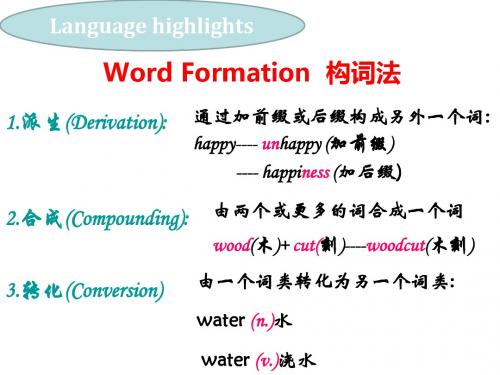
② -or ……的人 actor visitor ③ -ess 表示女性,雌性 actress waitress ④ -ist ……家,者 artist violinist pianist
构成抽象名词&集合名词的后缀 ① v. + ment movement ② v. + ion / sion / tion / ation action invitation decision ③ n. + ship friendship membership ④ adj. + ness kindness illness happiness
Grammar: formation of words • 转化 (conversion) • 合成 (composition) • 派生 (derivation)
平时教授单词时注意强调其词 性,词汇的学习:音,形,义 读音,发音准确 形:拼写正确 义:词义,词性,用法
3.runningwater dining room drinking water reading room 4.handwriting horse riding 5.warm-hearted cold-blooded part-time broad- minded man-made handmade 6.good-looking 7. outside inside within without
comfortable
lucky
healthy
necessary welcome common able
unfriendly unhappy uncomfortable un lucky unhealthy
“un-”
opposites
构词法(Word Formation)_英语语法学习
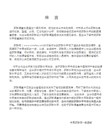
C.合成词(Compound Words)
定义:由两个或两个以上独立且语义不相同的词结合成一个表达新的语义和语词功能的词称为合成词。
class(班级)+room(房间)→classroom(教室)
black(黑色的)+board(木板)→blackboard(黑板)
3.合成词(Compound Words)
A.词根(Root)
定义:英文词形成的“根基”部分称为词根(亦称字根)。
现以“like”为例列示如下:
Root
like................................................... 像
(刚经过的那位女士是我们的英语老师。)
解说:上面各例都是句子。例A是表示我们生活中周边的静态事物,例B是表达事物的动态现象,例C所表达的是两者都有。
那么句子是由什么来组成的呢?由上面各例可以了解句子的组成要素如下:
由上面的解说我们可以了解:
定义:词、短语、从句等称为句子组成的要素(Element)。
friend-ly.......................................... 友善的
friend-less................................................................. 友谊
此时重读音节原则上都是落在词根,例如“a-like,like-ness,un-like-ness”。
B.派生词(Derivative)
定义:由词根利用前缀或后缀派生而成的词称为派生词(亦称转成语)。现以“friend”为例列示如下:
前缀 词根 后缀
4.构词法 word formation

grav = heavy; serious gravity 重力;严重性 grave 严重 aggravate使恶化, aggravate使恶化, 使更严重 gress = go; walk progress 进步 aggressive 侵略的 hydr = water; liquid hydroelectric 水电的 hydrospace 海洋世界
ject = throw eject 喷射;逐出 injection 注射 reject 拒绝 interject打断,插话 interject打断,插话 labor = work laborious 费力的 collaborate 合作,协作 liter = letter literature 文学 illiterate 文盲 literal 按照词的本意的;直译的
loc = place location 地点 allocate 分配 local lumi = light; bright illuminate 照明 magni = big; great magnificent 宏大的 magnify 放大 magnitude 巨大,广大
man(u) = hand manage 管理 manuscript 手稿 manual手册 manual手册 mar = sea submarine 潜艇 海底的 maritime 海事的,海运的 meter/metri = measure thermometer 温度计 gas-meter gas-
fact = make; do manufacture 制造 factory 工厂 fer = carry; bring ferry 轮渡 transfer 搬运,转移 interfere 干预 defer遵从, 推迟 defer遵从, confer 授予;协商 fin = end; limit final最后的 final最后的 infinite 无限的
构词法 Word Formation
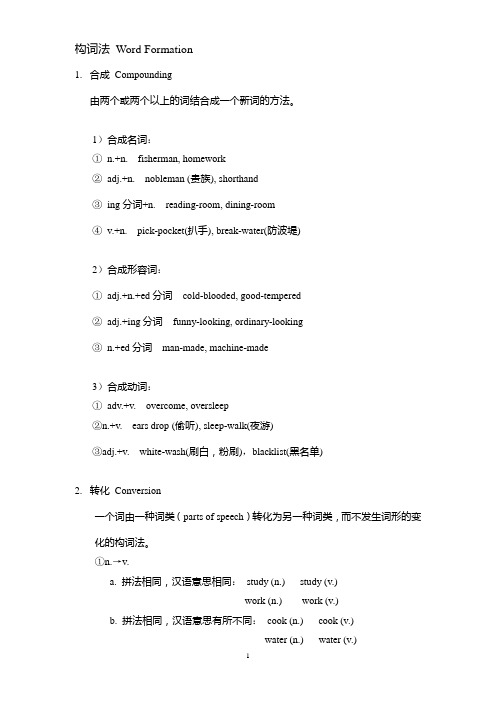
构词法Word Formation1.合成Compounding由两个或两个以上的词结合成一个新词的方法。
1)合成名词:①n.+n. fisherman, homework②adj.+n. nobleman (贵族), shorthand③ing分词+n. reading-room, dining-room④v.+n. pick-pocket(扒手), break-water(防波堤)2)合成形容词:①adj.+n.+ed分词cold-blooded, good-tempered②adj.+ing分词funny-looking, ordinary-looking③n.+ed分词man-made, machine-made3)合成动词:①adv.+v. overcome, oversleep②n.+v. ears drop (偷听), sleep-walk(夜游)③adj.+v. white-wash(刷白,粉刷),blacklist(黑名单)2.转化Conversion一个词由一种词类(parts of speech)转化为另一种词类,而不发生词形的变化的构词法。
①n.→v.a. 拼法相同,汉语意思相同:study (n.) study (v.)work (n.) work (v.)b. 拼法相同,汉语意思有所不同:cook (n.) cook (v.)water (n.) water (v.)②adj.→v. empty (adj.) empty (v.)free (adj.) free (v.)③adj.→n. native (adj.) native (n.)right (adj.) native (n.)④v.→n. record (v.) record (n.)conduct (v.) conduct (n.)use(v.) use (n.)excuse (v.) excuse (n.)advise (v.) advice (n.)believe (v.) belief (n.)3.派生Derivation在词根上加前缀或后缀构成新词。
英语构词法wordformation
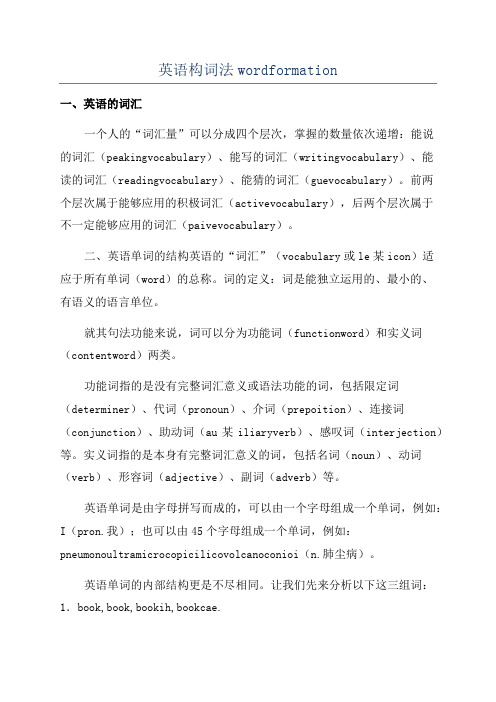
英语构词法wordformation一、英语的词汇一个人的“词汇量”可以分成四个层次,掌握的数量依次递增:能说的词汇(peakingvocabulary)、能写的词汇(writingvocabulary)、能读的词汇(readingvocabulary)、能猜的词汇(guevocabulary)。
前两个层次属于能够应用的积极词汇(activevocabulary),后两个层次属于不一定能够应用的词汇(paivevocabulary)。
二、英语单词的结构英语的“词汇”(vocabulary或le某icon)适应于所有单词(word)的总称。
词的定义:词是能独立运用的、最小的、有语义的语言单位。
就其句法功能来说,词可以分为功能词(functionword)和实义词(contentword)两类。
功能词指的是没有完整词汇意义或语法功能的词,包括限定词(determiner)、代词(pronoun)、介词(prepoition)、连接词(conjunction)、助动词(au某iliaryverb)、感叹词(interjection)等。
实义词指的是本身有完整词汇意义的词,包括名词(noun)、动词(verb)、形容词(adjective)、副词(adverb)等。
英语单词是由字母拼写而成的,可以由一个字母组成一个单词,例如:I(pron.我);也可以由45个字母组成一个单词,例如:pneumonoultramicrocopicilicovolcanoconioi(n.肺尘病)。
英语单词的内部结构更是不尽相同。
让我们先来分析以下这三组词:1.book,book,bookih,bookcae.第二组例词都可以被分析成更小的有意义的单位:toler+ate,toler+ance,toler+ant,toler+ation,toler+able,in+toler+a ble。
toler-的语义从这些例词中已经体现出来:“忍受、容忍”;-ate 往往用来构成动词,表示“成为”,如negate,evaporate,agitate;-ance用来构成名词,表示“性质”“状况”、等意思,如vigilance,arrogance,defiance;-ant可以用来构成形容词,表示“的“意思,如vigilant,arrogant,defiant;-ation用来构成名词,表示“动作”、“状态”、“结果”,如education,dictation,organization,foundation;-able经常用来构成形容词,表示“可的”,如eatable,acceptable,variable;in-往往用在词的前面,表示否定的意义,如incapable,inaccurate,infirm。
Word formation

构词法概述语言的基本要素之一是词汇。
在语言发展的最初阶段,人们使用的是少量而简单的词汇,这些词汇只表示日常简单的事物和概念,构成语言中最基本的词,称之为原生词,也叫基本词或词根。
英语里的原生词大都是单音节的,例如:sun, man, head, foot, fish, see, run等,其数量有限。
随着社会的发展与进步,语言的扩充与融合使语言变得复杂,原有的有限的原生词已不够用,人们便创造了一些新词来表示新生的事物和概念。
按照一定的语言规则创造新词的方法,称之为构词法(word-formation or word-building)。
一、英语主要有三种构词法1. 转化(Conversion):不用借助构词词缀,把一个单词从一种此类转化成另一种词类。
由于词类转化的结构,英语中就形成了大量外形相同但词类不同的词,即同形异类词water水n. →water浇水v. film 电影n.→film 拍电影v.2. 派生(Derivation):通过加前缀和后缀构成另一个词happy→unhappy 加前缀→happiness 加后缀3. 合成(Compounding):由两个或更多词构成一个词black黑的+board板→blackboard黑板happy + go + lucky→happy-go-lucky无忧无虑的pick摘,挖+ pocket口袋→pickpocket 扒手二、英语还有一些次要构词法1. 截短法(Clipping):把一个词的一部分去掉,构成一个新词bicycle→cycle2. 混合(Blending):把两个词各取一部分,混合成一个新词motor + hotel→motel汽车旅馆3. 缩写(Abbreviation):把几个词的首字母连在一起International Monetary Fund→IMF国际货币基金组织4. 反转构词法(Backformation):把带词尾的名词去掉词尾构成动词editor (n.)→edit(v.)三、构词法的运用要学好英语,掌握构词法直观重要。
构词法简介Word Formation

构词法简介Word Formation构词法(Word Formation)1. 派生(Derivation)2. 转化(Conversion)3. 合成(Compounding)4. 混合(Blends)5.其他构词法1.派生(Derivation)通过加前缀或后缀构成另一个词1). 后缀(suffix)*名词后缀-or actor sailor-ist scientist-ment achievement movement-(a)tion preparation exception-y difficulty discovery*形容词后缀-ful useful cheerful-able comfortable enjoyable-ed manned cultured-less careless fearless-ive active decisive-an European Indian*动词后缀-ize realize modernize-en widen strengthen*副词后缀-ly really extremely-ward backward eastward*数词后缀-teen fourteen fifteen-ty forty fifty-th ninth twelfth2). 前缀(prefix)一般不造成词类的转变,只是引起意思的变化e.g. un-(不,或做相反动作) unhappy undoim-(不) impossible impolitere-(重新) retell rewritemis-(错误的) misunderstand misspell个别前缀会引起词类的变化e.g. en-(使得…) endanger enlargea- asleep awake2. 转化(conversion)一般拼写不变,但是词类发生了变化,有时发音也变化e.g. water n. 水---- water v. 浇水record n. 记录,唱片---- record v. 记录,录音dirty adj. 脏的---- dirty v. 弄脏3. 合成(Compounding)由两个或更多的词合成一个词e.g. wood(木)+cut(刻)=woodcut(木刻)man(人)+kind(种类)=mankind(人类)air(空气,空中)+sick(恶心的,晕的)=airsick(晕机的)broad(宽的)+band(波段)=broadband(宽频的,波带宽的) 4. 混合词(blends)把两个词取一部分合在一起,构成新词e.g. hi-tech=high+technologye-school=electronic+schoolsmog(烟雾)=smoke+fogbrunch=breakfast+lunch 5.其他构词法如:缩写IT=information technology ad= advertisement。
英语构词法
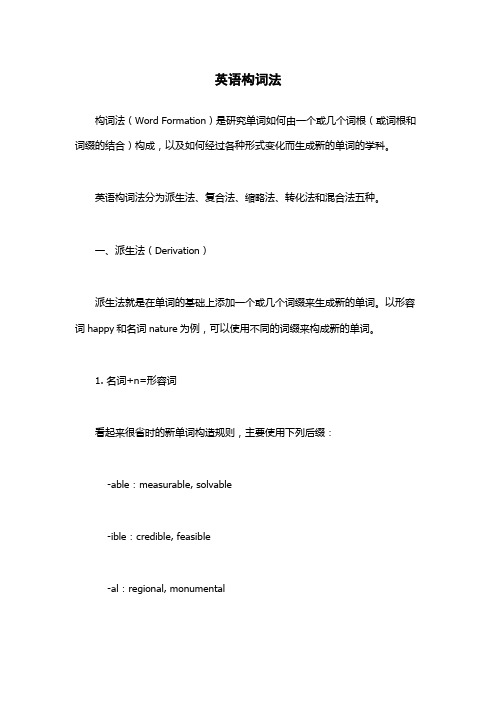
英语构词法构词法(Word Formation)是研究单词如何由一个或几个词根(或词根和词缀的结合)构成,以及如何经过各种形式变化而生成新的单词的学科。
英语构词法分为派生法、复合法、缩略法、转化法和混合法五种。
一、派生法(Derivation)派生法就是在单词的基础上添加一个或几个词缀来生成新的单词。
以形容词happy和名词nature为例,可以使用不同的词缀来构成新的单词。
1. 名词+n=形容词看起来很省时的新单词构造规则,主要使用下列后缀:-able:measurable, solvable-ible:credible, feasible-al:regional, monumental-ful:helpful, grateful-ic:heroic, hypothermic-ical:radical, historical-ous:dangerous, famous-y:windy, rainy例如:nature的派生词有natural、naturable、naturalistic、naturalized、naturelike等。
2. 形容词+n=名词可以把形容词后缀变为名词后缀,如-ism、-ity。
常见的派生词包括:-ism:communism, fascism-ity:prosperity, stability例如:happy的派生词有happiness。
3. 动词+n/v+ing=名词可以将动词转化为名词,通常使用-ment、-ing、-ion、-sion等词缀。
经典的派生词有:-ment:enjoyment, establishment-ing:fishing, reading-ion/sion:completion, conversion例如:enjoy的派生词有enjoyment。
4. 名词+n/v+er=动词通常使用词缀-ize、-fy、-ate、-en等,如:-ize:realize, prioritize-fy:satisfy, identify-ate:annihilate, elaborate-en:lengthen, strengthen例如:computer的派生词有computerize。
- 1、下载文档前请自行甄别文档内容的完整性,平台不提供额外的编辑、内容补充、找答案等附加服务。
- 2、"仅部分预览"的文档,不可在线预览部分如存在完整性等问题,可反馈申请退款(可完整预览的文档不适用该条件!)。
- 3、如文档侵犯您的权益,请联系客服反馈,我们会尽快为您处理(人工客服工作时间:9:00-18:30)。
(E). 表示时间的前缀 preprewar, preview, prediction postpostwar fore-(前,预先) foretell, forecast, foresee, weather forecast
(F). 表示方位的前缀: sub-(下面的;下一级的) subway, submarine, subcontinent(次大陆) inter-(…之间) international, intercity, interclass(年级之间)
3. 名词变形容词: -y windy, rainy, sandy -ish foolish, feverish -some handsome, troublesome, awesome -ous dangerous, humorous -ful helpful, careful, peaceful
adv.
1. 动词变名词: -ation satisfaction, education, imagation realization(实现;领悟) -ment development, movement, disappointment
-al
arrival, refusal, denial
-ee trainee, employee -er teacher, worker -or visitor, sailor
(B). 表示错误或失当的前缀: mis-misjudge, misdirect(误导), mistrust misleading, misunderstand, misuse
(C). 表示向/背的前缀: pro-(亲,支持) pro-Chinese, pro-American anti-(阻止,抗) anti-war, anti-Japanese war, anti-pollution, antibody(抗体), anti-missile
Word Formation
Affixation
Y
UN ANG SENIOR HIGH SCHOOL
Word Formation (构词法)
词缀法 Affixation Composition 合成法 Conversation 转化法
Prefix(前缀) Suffix(后缀)
Composition: mooncake, toothache, deadline, air-conditioner, daybreak, day-dreamer, handwriting, honeymoon, good-looking, well-known
(D). 表示程度、大小的前缀 super-superstar, supermarket, superman, superpower over-(过于;过度) over-anxious, overeat, overuse, overcharge miniminibus, miniskirt, mini-car underunderground, underwear, underline under-developed(落后的) semi-(半,部分) semicircle, semiskilled,semi-automatic semi-liquid
Conversation: Smile, head, farm, walk
Prefix(前缀)
un
il
im
dis non
ir
in
mis
pre
sub
(A). 表示否定的前缀: un-unfair, unhappy, unimportant, unable, undo, uninstall non-non-smoker, non-violence, non-president in-inactive, inhuman(不人道的), indirect, injustice, incorrect, inseparable dis-disadvantage, disappear, disobey, dishonesty im-impolite, impossible, immoral, imbalance (用在b,p,m 开头的词前) il-illegal, illogical (l开头的词前) ir-irreal, irregular, irrelative (r开头的词前)
trans-(横过,通过,超越,进入) transplant, transnational, transatlantic
Suffix(后缀)
ful
er
ment or
ist
less
ation mis
ish ness
care n. 照顾,护理 v.关注,注意 careful adj.小心的 careless adj.粗心的 carefully adv. carelessly carefulness n. carelessness n.
2. 形容词变名词 -ness happiness, sadness meanness, carelessness -ity ability, possibility, equality -ism (…主义) Marxism, criticism,realism, idealism, socialism, optimism
4. 名词、形容词变动词: -ify beautify, simplify, personify, identify
-ize
realize, apologize, critcize, modernize
-en
quicken, widen, sharpen, deepen, strengthen, sweeten, brighten
